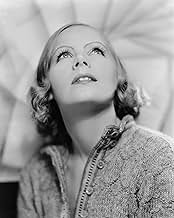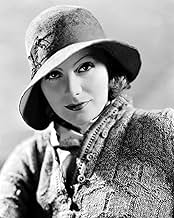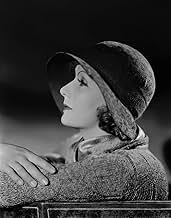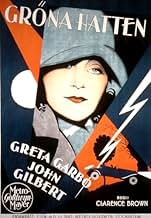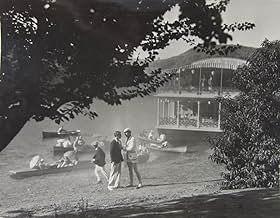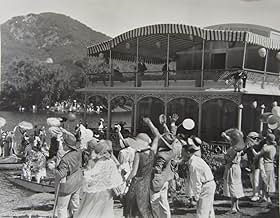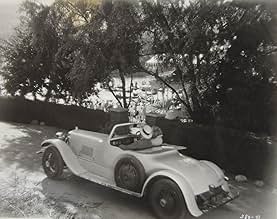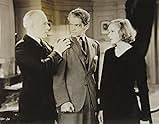IMDb RATING
7.1/10
1.8K
YOUR RATING
When two childhood sweethearts are kept from marrying, misery ensues.When two childhood sweethearts are kept from marrying, misery ensues.When two childhood sweethearts are kept from marrying, misery ensues.
- Nominated for 1 Oscar
- 2 wins & 1 nomination total
Johnny Mack Brown
- David Furness
- (as John Mack Brown)
Gertrude Astor
- Party Guest
- (uncredited)
Agostino Borgato
- French Police Inspector
- (uncredited)
Sydney Jarvis
- Gendarme
- (uncredited)
Fred Kelsey
- Detective
- (uncredited)
Anita Louise
- Diana - as a Child
- (uncredited)
Alphonse Martell
- French Hotel Concierge
- (uncredited)
William H. O'Brien
- Man Peering Into Room
- (uncredited)
Frank Finch Smiles
- Butler
- (uncredited)
Featured reviews
A WOMAN OF AFFAIRS (MGM, 1928), directed by Clarence Brown, from the then controversial novel, "The Green Hat" by Michael Arlen, reunites then popular love team of John Gilbert and Greta Garbo in their third collaboration on screen. Initially teamed under Clarence Brown's direction in the highly popular FLESH AND THE DEVIL (1926), followed by LOVE (1927), taken from the Leo Tolstoy's classic novel, "Anna Karenina," Gilbert and Garbo once more star in a silent melodrama about love and tragedy. Unlike their earlier screen efforts, their characters in this story are already acquainted since childhood, leaving no chance of meeting and falling in love, but the difference here is that their relationship is interfered by a third party who happens not to be another lover or spouse. And unlike their earlier two films, Garbo is more the central focus here than Gilbert.
The story begins quite amusingly, finding the wild and merry Diana Merrick (Greta Garbo) driving recklessly down the road in the Mack Sennett Keystone comedy fashion, nearly missing the ditch diggers as she drives over them. Moments later, the characters in the story, the Holderness and the Merricks, are introduced with each passing scene. Diane is a carefree woman who has loved Neville Holderness (John Gilbert) since childhood. She has a brother, Jeffry (Douglas Fairbanks Jr.), a pampered youth who's so bored with his life that his only satisfaction is boozing up with liquor. Jeffry's closest friend, David Furness (Johnny Mack Brown), tries to stop him from his wild and wicked ways, but to no avail. Neville's father, Sir Morton (Hobart Bosworth), disapproves of the Merrick family's way of life. When he learns that his son wants to marry Diana, he manages to send Neville away to Egypt for a few years, in hope that the two will forget one another through the passage of time. Two years later, Diana marries David. On their wedding night, detectives (one of them played by character actor Fred Kelsey) enter their honeymoon suite in France to arrest David on the charges of theft. Before he can be arrested, David ends his life by jumping out the window. To keep David's name clear for decency sake, she secretly sets out to repay the victims of David's past crimes, a deed only known to the family physician, Doctor Hugh Trevelyan (Lewis Stone). Over the next few years, Diana makes the gossip columns as being a widow of many love affairs throughout the world. As for Neville, he becomes engaged to marry a nice young girl named Constance (Dorothy Sebastian), whom, as Diana describes through the title cards, as a girl "whose eyes are so true and clean." But Old Man Holderness, knowing how his son and Diana still feel about one other, continues to keep the scandalous Diana away his son, causing Neville to become like Jeffry, an unbearable alcoholic.
While not as famous by today's standards as FLESH AND THE DEVIL, A WOMAN OF AFFAIRS somewhat predates those "Peyton Place"-type soap-operas or Lana Turner melodramas quite popular during the 1950s and 60s. It also shows that aristocratic families may have all the luxuries that money can buy, but money does not always buy happiness. Douglas Fairbanks Jr.'s portrayal as an unhappy youth who turns to drink, is quite believable, especially when his glassy eyes, uncombed hair almost covering a portion of his eye, with whiskey glass in his hand that at times has him resemble a young John Barrymore. Whether this was intentional or not will never be known. Fairbanks, however, does well with his early screen performance.
Clarence Brown's direction with the Gilbert-Garbo loves scenes do have some bonuses, but are not as "hot" as in FLESH AND THE DEVIL. One scene that stands out is finding Diana, wearing a special ring on her finger, making love to Neville on the couch, with Diana telling him, "I would only take it off for the man I love." The camera then pans down to her hand just as the ring slowly slips off her finger. As for the story itself, it takes place during a span of ten years, yet the characters in the plot don't look any different in the conclusion as they appear in the opening, making the storyline look more as if it takes place in a span of ten months than ten years. The costumes and hairstyles are obviously modern late 1920s, which works out better in the latter portion of the story than the early segments, circa 1918. And although Garbo has that special beauty, especially when properly photographed, she doesn't look particularly attractive in some of those costumes designed for her, mainly when wearing those flapper-designed hats. Essentially a silent movie that was initially distributed in theaters with recorded scoring, one wishes such a score for this film have been used for its current video distribution, which comes with a Thames stereo orchestral soundtrack. The stereo score has its moments, but when it comes to its slow tempo violin playing in some segments of the story, it becomes a real sleep inducer. A WOMAN OF AFFAIRS was remade by MGM in 1934 as OUTCAST LADY starring Constance Bennett and Herbert Marshall. Both versions are available for viewing on cable TV's Turner Classic Movies.
One final note: A WOMAN OF AFFAIRS was one of the 13 feature films presented on the public television series, MOVIES, GREAT MOVIES (Original air date: October 26, 1973), a 50th anniversary tribute to Metro-Goldwyn-Mayer of the silent era, as hosted by Richard Schickel, on WNET, Channel 13, in New York City. Clocked then at 109 minutes, the TCM print differs in scoring and length, either at 98 (Thames) or 91 minutes. (***)
The story begins quite amusingly, finding the wild and merry Diana Merrick (Greta Garbo) driving recklessly down the road in the Mack Sennett Keystone comedy fashion, nearly missing the ditch diggers as she drives over them. Moments later, the characters in the story, the Holderness and the Merricks, are introduced with each passing scene. Diane is a carefree woman who has loved Neville Holderness (John Gilbert) since childhood. She has a brother, Jeffry (Douglas Fairbanks Jr.), a pampered youth who's so bored with his life that his only satisfaction is boozing up with liquor. Jeffry's closest friend, David Furness (Johnny Mack Brown), tries to stop him from his wild and wicked ways, but to no avail. Neville's father, Sir Morton (Hobart Bosworth), disapproves of the Merrick family's way of life. When he learns that his son wants to marry Diana, he manages to send Neville away to Egypt for a few years, in hope that the two will forget one another through the passage of time. Two years later, Diana marries David. On their wedding night, detectives (one of them played by character actor Fred Kelsey) enter their honeymoon suite in France to arrest David on the charges of theft. Before he can be arrested, David ends his life by jumping out the window. To keep David's name clear for decency sake, she secretly sets out to repay the victims of David's past crimes, a deed only known to the family physician, Doctor Hugh Trevelyan (Lewis Stone). Over the next few years, Diana makes the gossip columns as being a widow of many love affairs throughout the world. As for Neville, he becomes engaged to marry a nice young girl named Constance (Dorothy Sebastian), whom, as Diana describes through the title cards, as a girl "whose eyes are so true and clean." But Old Man Holderness, knowing how his son and Diana still feel about one other, continues to keep the scandalous Diana away his son, causing Neville to become like Jeffry, an unbearable alcoholic.
While not as famous by today's standards as FLESH AND THE DEVIL, A WOMAN OF AFFAIRS somewhat predates those "Peyton Place"-type soap-operas or Lana Turner melodramas quite popular during the 1950s and 60s. It also shows that aristocratic families may have all the luxuries that money can buy, but money does not always buy happiness. Douglas Fairbanks Jr.'s portrayal as an unhappy youth who turns to drink, is quite believable, especially when his glassy eyes, uncombed hair almost covering a portion of his eye, with whiskey glass in his hand that at times has him resemble a young John Barrymore. Whether this was intentional or not will never be known. Fairbanks, however, does well with his early screen performance.
Clarence Brown's direction with the Gilbert-Garbo loves scenes do have some bonuses, but are not as "hot" as in FLESH AND THE DEVIL. One scene that stands out is finding Diana, wearing a special ring on her finger, making love to Neville on the couch, with Diana telling him, "I would only take it off for the man I love." The camera then pans down to her hand just as the ring slowly slips off her finger. As for the story itself, it takes place during a span of ten years, yet the characters in the plot don't look any different in the conclusion as they appear in the opening, making the storyline look more as if it takes place in a span of ten months than ten years. The costumes and hairstyles are obviously modern late 1920s, which works out better in the latter portion of the story than the early segments, circa 1918. And although Garbo has that special beauty, especially when properly photographed, she doesn't look particularly attractive in some of those costumes designed for her, mainly when wearing those flapper-designed hats. Essentially a silent movie that was initially distributed in theaters with recorded scoring, one wishes such a score for this film have been used for its current video distribution, which comes with a Thames stereo orchestral soundtrack. The stereo score has its moments, but when it comes to its slow tempo violin playing in some segments of the story, it becomes a real sleep inducer. A WOMAN OF AFFAIRS was remade by MGM in 1934 as OUTCAST LADY starring Constance Bennett and Herbert Marshall. Both versions are available for viewing on cable TV's Turner Classic Movies.
One final note: A WOMAN OF AFFAIRS was one of the 13 feature films presented on the public television series, MOVIES, GREAT MOVIES (Original air date: October 26, 1973), a 50th anniversary tribute to Metro-Goldwyn-Mayer of the silent era, as hosted by Richard Schickel, on WNET, Channel 13, in New York City. Clocked then at 109 minutes, the TCM print differs in scoring and length, either at 98 (Thames) or 91 minutes. (***)
This film is a great Garbo vehicle, and has such a perfect example of her mystique. She somehow manages to be a woman who enjoys sexual pleasure and the company of men, but at the same time, is saintly, with a love that is pure for only one man, and sacrifices herself in more than one way ... and she is transcendent on both sides of this coin. The film is packed with moments where a range of her wonderful expressions are on display, some vivid, some subtle. If you're a Garbo fan or want to become one, this would certainly not be a bad place to start.
Unfortunately, the film suffers a bit from a heavy dose of melodrama, most of which seems pretty contrived. The plot often doesn't make a lot of sense, in part because the original story was watered down pretty significantly for the censors. An example of this is the questioning of Garbo after her husband has committed suicide. It's obvious why this happened; he was about to be arrested for embezzlement and the police saw him jump, so the viewer (ok me anyway) is watching the aftermath thinking huh? In the original, however, it was because he has syphilis, something that was obviously a personal secret, and hence the questioning (and also later shunning) of Garbo. There are other examples that took too much of the edge off the story and made it less sensical.
Garbo dominates the film, but it's a fine cast behind her. John Gilbert is given less to do here which is too bad, but the chemistry the pair had is quite evident in a couple of open lip kisses. Dorothy Sebastian is radiant as a virtuous woman, and Douglas Fairbanks, Jr. is suitably desperate as an alcoholic.
The film touches on marrying someone who is decent and loving them for that quality, but being passionate and truly in love with someone else, which is a timeless theme. The scene where Garbo is waiting in her honeymoon bed and gets a tepid kiss on the forehead, then in frustration resorts to turning on and off the overhead light after being left alone says it all. At one point her real love, played, by Gilbert, asks "Why did I ever let you go?" to which she responds "Yes, why?", and I don't think the film gives a good answer to this question, especially as it plays out. The pace as it does so is a little on the slow side too, and the dramatic ending is over-the-top. It's a near miss for getting a higher rating, but it's certainly watchable for Garbo.
Unfortunately, the film suffers a bit from a heavy dose of melodrama, most of which seems pretty contrived. The plot often doesn't make a lot of sense, in part because the original story was watered down pretty significantly for the censors. An example of this is the questioning of Garbo after her husband has committed suicide. It's obvious why this happened; he was about to be arrested for embezzlement and the police saw him jump, so the viewer (ok me anyway) is watching the aftermath thinking huh? In the original, however, it was because he has syphilis, something that was obviously a personal secret, and hence the questioning (and also later shunning) of Garbo. There are other examples that took too much of the edge off the story and made it less sensical.
Garbo dominates the film, but it's a fine cast behind her. John Gilbert is given less to do here which is too bad, but the chemistry the pair had is quite evident in a couple of open lip kisses. Dorothy Sebastian is radiant as a virtuous woman, and Douglas Fairbanks, Jr. is suitably desperate as an alcoholic.
The film touches on marrying someone who is decent and loving them for that quality, but being passionate and truly in love with someone else, which is a timeless theme. The scene where Garbo is waiting in her honeymoon bed and gets a tepid kiss on the forehead, then in frustration resorts to turning on and off the overhead light after being left alone says it all. At one point her real love, played, by Gilbert, asks "Why did I ever let you go?" to which she responds "Yes, why?", and I don't think the film gives a good answer to this question, especially as it plays out. The pace as it does so is a little on the slow side too, and the dramatic ending is over-the-top. It's a near miss for getting a higher rating, but it's certainly watchable for Garbo.
Adapted from the novel "The Green Hat", I would have retitled it "Two Gallant Ladies and The Men Who Messed Everything Up". However, even that doesn't do it justice. This is almost a feminist film. Garbo is one of the two of the last "Mad Merricks", not much more is said about the family name except that Diana is independently wealthy and somewhat reckless. In the opening scene she is driving her car wildly through the countryside with her first and only true love, Neville Holderness (John Gilbert), as a passenger. They have been in love since childhood and want to marry. However, Neville's dad, Sir Morton, does not want this marriage. No valid reason is given other than perhaps he does not want the pitter patter of little mad Merricks to end up being his heirs.
Neville has no money in his own name, so his dad uses this fact to get Neville to agree to take a job in Egypt, before he marries Diana, so that he can earn some money and start a career. Dad just wants to separate the pair on the hope that they will forget about one another. Diana sees through the ruse, and Neville doesn't even bother to say a last goodbye -again, dad's idea. Complications, heartache, and tragedy ensue.
The reason I say this is almost a feminist film is because the only two women in the film - Diana and Constance (Dorothy Sebastian) are the only virtuous people in the entire cast. Hugh (Lewis Stone), long time family friend of the Merricks, comes close, but near the end breaks a trust in doing what he thinks is a good deed. Jeffry, Diana's brother, is an alcoholic, Neville is ultimately a coward, his dad is a snob, and David Furness, who has always loved Diana and been Jeffry's hero since childhood, has his problems too. Problems so bad that Diana ruins her reputation in order to keep them secret so that the image that her brother Jeffry has of him can stay intact. In this way, she is a gallant lady. As for Constance, she is the girl of whom Neville's dad approves, so Neville marries her like the obedient son that he is. However, Constance is wise. She can see Neville and Diana are still in love, and does not blame either of them for something they cannot help. Thus she is also a gallant lady.
I'll let you watch and see how this all works out. I think it is Garbo's best silent film. She gives a strong performance in a film with a good plot and a good cast surrounding her, and as always, her chemistry with Gilbert is wonderful. Highly recommended.
Neville has no money in his own name, so his dad uses this fact to get Neville to agree to take a job in Egypt, before he marries Diana, so that he can earn some money and start a career. Dad just wants to separate the pair on the hope that they will forget about one another. Diana sees through the ruse, and Neville doesn't even bother to say a last goodbye -again, dad's idea. Complications, heartache, and tragedy ensue.
The reason I say this is almost a feminist film is because the only two women in the film - Diana and Constance (Dorothy Sebastian) are the only virtuous people in the entire cast. Hugh (Lewis Stone), long time family friend of the Merricks, comes close, but near the end breaks a trust in doing what he thinks is a good deed. Jeffry, Diana's brother, is an alcoholic, Neville is ultimately a coward, his dad is a snob, and David Furness, who has always loved Diana and been Jeffry's hero since childhood, has his problems too. Problems so bad that Diana ruins her reputation in order to keep them secret so that the image that her brother Jeffry has of him can stay intact. In this way, she is a gallant lady. As for Constance, she is the girl of whom Neville's dad approves, so Neville marries her like the obedient son that he is. However, Constance is wise. She can see Neville and Diana are still in love, and does not blame either of them for something they cannot help. Thus she is also a gallant lady.
I'll let you watch and see how this all works out. I think it is Garbo's best silent film. She gives a strong performance in a film with a good plot and a good cast surrounding her, and as always, her chemistry with Gilbert is wonderful. Highly recommended.
I'd seen the remake Outcast Lady before I rented the original silent version A Woman of Affairs. In both stories, the plot is heavily censored from the novel, but if you don't know what's been cut it still seems entertaining and complex.
In this cast, Greta Garbo is in love with her childhood friend, John Gilbert, but his father doesn't approve. When he sends his son away for a years-long business trip, Greta retaliates by marrying her brother's best friend, Johnny Mack Brown. On their wedding night, Johnny gets upset and commits suicide, but since Greta refuses to tell anyone why he was so upset, everyone assumes it was her fault. Her brother, Douglas Fairbanks, Jr., in particular, blames her and accuses her of confessing sinful secrets to Johnny that made him rather die than face a life with her. Greta is banished, and Doug Jr. drinks to drown his sorrows. Only one man continually stands up for her, her pal Lewis Stone, who might harbor more than friendship in his heart.
In both versions, the woman's character doesn't really make sense. You can get past her marrying a man she doesn't love because she believes the man she does love has forgotten her, but accepting a banishment and terrible reputation when a simple explanation could have cleared things up doesn't make much sense. And after such a terrible scandal, for which she is blamed, it hardly makes sense to turn into a hussy. Why is that the answer to her problems? The rest of it is a good old-fashioned melodrama, so if you like soapy plots like that, you'll probably like to see one of the versions. Having seen both, I actually prefer the silent movie to the talkie. The story is simple and doesn't need a lot of dialogue, and since it's so over-the-top, it makes sense to have over-the-top acting to go along with it.
In this cast, Greta Garbo is in love with her childhood friend, John Gilbert, but his father doesn't approve. When he sends his son away for a years-long business trip, Greta retaliates by marrying her brother's best friend, Johnny Mack Brown. On their wedding night, Johnny gets upset and commits suicide, but since Greta refuses to tell anyone why he was so upset, everyone assumes it was her fault. Her brother, Douglas Fairbanks, Jr., in particular, blames her and accuses her of confessing sinful secrets to Johnny that made him rather die than face a life with her. Greta is banished, and Doug Jr. drinks to drown his sorrows. Only one man continually stands up for her, her pal Lewis Stone, who might harbor more than friendship in his heart.
In both versions, the woman's character doesn't really make sense. You can get past her marrying a man she doesn't love because she believes the man she does love has forgotten her, but accepting a banishment and terrible reputation when a simple explanation could have cleared things up doesn't make much sense. And after such a terrible scandal, for which she is blamed, it hardly makes sense to turn into a hussy. Why is that the answer to her problems? The rest of it is a good old-fashioned melodrama, so if you like soapy plots like that, you'll probably like to see one of the versions. Having seen both, I actually prefer the silent movie to the talkie. The story is simple and doesn't need a lot of dialogue, and since it's so over-the-top, it makes sense to have over-the-top acting to go along with it.
There really was an art to silent film acting. It wasn't just all exaggerated facial expressions. That becomes clear when you see really good silent actors who know exactly how to put across the material.
Greta Garbo and John Gilbert are really, really good, and they sell the melodrama of "A Woman of Affairs" in a way that others couldn't. In the best of circumstances, films this old feel antiquated by today's standards, but "A Woman of Affairs" feels more sophisticated than other films of its type because of the subtle downplaying of Garbo and Gilbert. Garbo creates an actual woman responding to events that feel like they could actually happen to a real person rather than a stock character histrionically reacting to tear-jerking plot devices. She's fascinating to watch, conveying much with the lift of an eyebrow or a small hand gesture. Her performance here makes it clear why she had the stuff to make the transition to sound.
I have to give director Clarence Brown his due as well. There's a fluid, cinematic quality to this film that makes it feel far more mature than pretty much any of the early sound films coming out around the same time. For example, the film that won the Best Picture Oscar in the year of this film's release was "The Broadway Melody," a dreadful early sound film without a brain in its head. Compare that to the mature subject matter of "A Woman of Affairs" -- the homoerotic obsession one man has for another, for starters -- and you can see how much more daring late silents were than early talkies.
Bess Meredyth, credited in the opening titles with "continuity," received an Oscar nomination for Best Writing for her work on both this and another Clarence Brown film, 1929's "Wonder of Women," at the 1928-29 Oscars. This was during the time when the eligibility period for the Oscars was a wonky August 1 of one year through July 31 of the following year, and it wouldn't be until 1934 when the Academy changed the eligibility period to match the calendar year. This was also during that brief window of time when Oscar nominations could site work on multiple films, as Meredyth's writing nomination did.
Grade: A-
Greta Garbo and John Gilbert are really, really good, and they sell the melodrama of "A Woman of Affairs" in a way that others couldn't. In the best of circumstances, films this old feel antiquated by today's standards, but "A Woman of Affairs" feels more sophisticated than other films of its type because of the subtle downplaying of Garbo and Gilbert. Garbo creates an actual woman responding to events that feel like they could actually happen to a real person rather than a stock character histrionically reacting to tear-jerking plot devices. She's fascinating to watch, conveying much with the lift of an eyebrow or a small hand gesture. Her performance here makes it clear why she had the stuff to make the transition to sound.
I have to give director Clarence Brown his due as well. There's a fluid, cinematic quality to this film that makes it feel far more mature than pretty much any of the early sound films coming out around the same time. For example, the film that won the Best Picture Oscar in the year of this film's release was "The Broadway Melody," a dreadful early sound film without a brain in its head. Compare that to the mature subject matter of "A Woman of Affairs" -- the homoerotic obsession one man has for another, for starters -- and you can see how much more daring late silents were than early talkies.
Bess Meredyth, credited in the opening titles with "continuity," received an Oscar nomination for Best Writing for her work on both this and another Clarence Brown film, 1929's "Wonder of Women," at the 1928-29 Oscars. This was during the time when the eligibility period for the Oscars was a wonky August 1 of one year through July 31 of the following year, and it wouldn't be until 1934 when the Academy changed the eligibility period to match the calendar year. This was also during that brief window of time when Oscar nominations could site work on multiple films, as Meredyth's writing nomination did.
Grade: A-
Did you know
- TriviaMichael Arlen's 1924 novel was turned into a play of the same title, "The Green Hat." It opened on Broadway at the Broadhurst Theatre, 235 W. 44th St., on September 25, 1925 and ran for 231 performances.
- GoofsWhen Diana (as a child) rides her bike into the tree, the cut from the little girl (with short legs and her foot off the pedal) to the stunt-double (with long legs and her foot on the pedal) is obvious.
- Quotes
Title Card: The widow of David Furness faced a questioning world. Why should a man - happy as David was - take his own life - - ?
- Alternate versionsMetro-Goldwyn-Mayer also released this picture as a totally silent movie.
- ConnectionsFeatured in Strictly Dishonorable (1951)
- How long is A Woman of Affairs?Powered by Alexa
Details
- Release date
- Country of origin
- Language
- Also known as
- La mujer ligera
- Filming locations
- Production company
- See more company credits at IMDbPro
Box office
- Budget
- $383,000 (estimated)
- Runtime
- 1h 38m(98 min)
- Color
- Sound mix
- Aspect ratio
- 1.33 : 1
Contribute to this page
Suggest an edit or add missing content

